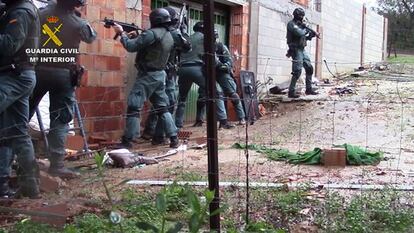Civil servant arrested for leading major drug gang in Campo de Gibraltar
The City Hall worker was one of 47 people caught in a sweeping narcotics bust in the south of Spain

By day he was a civil servant but by night he was a drug trafficker for one of Spain’s largest hashish gangs. That was until he was arrested by the Civil Guard in a major drug bust in Campo de Gibraltar, in the south of Spain. Working at City Hall gave him the perfect cover to lead an organization that brought up to 62,000 kilos of hashish to Spanish shores a year.
The public worker was just one of 57 people arrested in so-called Operation Albarraxín, a sweeping investigation that has led to the seizure of 10 tons of drugs and recovered or confiscated more than €3.3 million worth in goods.
What’s important is that everything has been dismantled
Civil Guard sources
The trafficking network worked like a big collective, capable of introducing tens of thousands of kilos of drugs from the coast between Tarifa in Cádiz up to Manilva in Málaga. “It is one of the most important criminal organizations dedicated to drug trafficking between North Africa and Europe through the coast of Andalusia,” the Civil Guard announced in a press release on Thursday.
It took four months of investigation, arrests and raids for the Civil Guard in Cádiz, Algeciras and Málaga to take down the criminal network. “What’s important is that everything has been dismantled, although the investigation into money laundering continues,” say sources close to the investigation.
It was in August when officers noticed that a “very active” drug gang was working in the area surrounding the Strait of Gibraltar. The gang was bringing in more than 60,000 kilos of hashish a year from Morocco. To do this, it had organized itself like a cooperative with up to three main ringleaders, one of them being the public worker. The three leaders shared supplies and human resources and arranged drug shipments along the coast according to what opportunities were on offer, one officer explains.
As well as the three ringleaders, the Civil Guard arrested 57 people who were working for the criminal network. Some were arrested while picking up a shipment, others while guarding the drugs or in a stolen vehicle used to transport the packages. The judge in charge of the case has sent more than half of them to prison.
The operation has led to the seizure of 10 tons of hashish and recovered or confiscated more than €3.3 million worth in goods
The drug gang used experienced captains to pilot speedboats, who were “very well remunerated and considered” for their work. On land, authorities went after all rungs of the network, from those in charge of unloading the drug shipments to the lookouts, the lowest on the ladder, who used their phones to warn if police were around. During the operation, police confiscated 30 cellphones, some with stickers indicating the meeting place for the informants.
The highly organized criminal network looked after every stage of the drugs’ movement. They shipped out the merchandise from North Africa, transported it using jeeps and vehicles stolen by another division of the gang, then kept it under guard until it was ready to be distributed across Europe. Civil Guard officers found up to 10 spots that were used to hide the drugs across Manilva, Casares, San Enrique de Guadiaro, Tesorillo, Estepona and Tarifa. In San Roque and Manilva, the drugs were stored at construction sites, and in Tarifa, the group used good containers on farms.
A drug shipment would move between different hiding spots, first to one along the coast then to another further inland with better security where it would stay until it was sent to Europe. At all stages the gang employed its own personnel to protect the drugs and ensure they were not stolen by rival organizations.
The Civil Guard seized 9,640 kilograms of hashish during three home raids and seized more than €3 million worth of property and goods. Officers also found documentation that will now be reviewed by specialists in investigating money laundering.
English version by Melissa Kitson.
Tu suscripción se está usando en otro dispositivo
¿Quieres añadir otro usuario a tu suscripción?
Si continúas leyendo en este dispositivo, no se podrá leer en el otro.
FlechaTu suscripción se está usando en otro dispositivo y solo puedes acceder a EL PAÍS desde un dispositivo a la vez.
Si quieres compartir tu cuenta, cambia tu suscripción a la modalidad Premium, así podrás añadir otro usuario. Cada uno accederá con su propia cuenta de email, lo que os permitirá personalizar vuestra experiencia en EL PAÍS.
¿Tienes una suscripción de empresa? Accede aquí para contratar más cuentas.
En el caso de no saber quién está usando tu cuenta, te recomendamos cambiar tu contraseña aquí.
Si decides continuar compartiendo tu cuenta, este mensaje se mostrará en tu dispositivo y en el de la otra persona que está usando tu cuenta de forma indefinida, afectando a tu experiencia de lectura. Puedes consultar aquí los términos y condiciones de la suscripción digital.









































